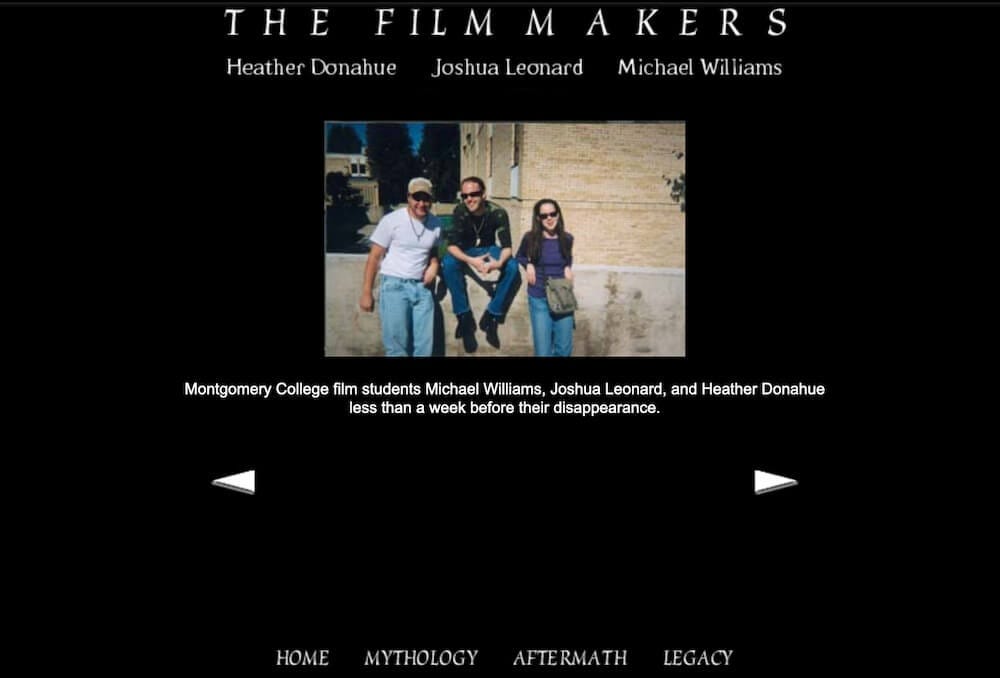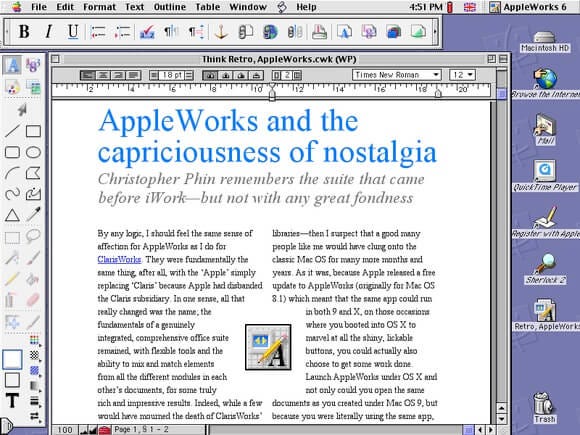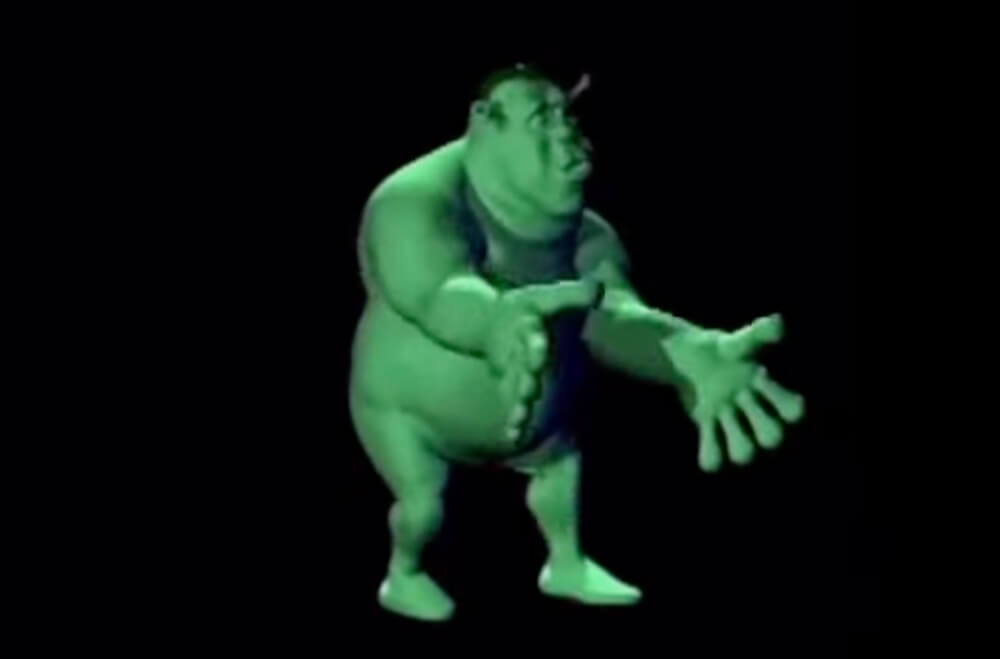Sept 2: How the Weirdest ‘80s Show, Small Wonder, Predicted the Future (Just Not of Robotics)
Plus Chris Farley's Shrek test footage, ClarisWorks, Blair Witch, and more
The ‘80s & ‘90s pop culture you loved, forgot, or never knew existed
September 2nd, 2022 • Issue 115
How the Weirdest ‘80s Show, Small Wonder, Predicted the Future (Just Not of Robotics)
37 years ago, on September 7th, 1985, Small Wonder premiered.
‘80s TV is infamous (or beloved, depending on your feelings toward ironic nostalgia) for its weirdness. Show after show tried going the unusual route to grab eyeballs. From Manimal to Max Headroom, the ‘80s let it all fly.
Small Wonder is often considered the weirdest of the bunch. For those unfamiliar, Small Wonder was a family sitcom about a scientist who invented a lifelike child robot named Vicki and had her live with his family. Vicki had an endless set of incredible skills, many of which transcended robotics and ventured into the realm of magical superpowers.
The show then applied its robot-fish-out-of-water premise to standard sitcom tropes. Small Wonder ran for a tight four seasons and 96 episodes.
It wasn’t good, though it was pretty popular.
And despite its reputation for maximum weirdness and minimum quality, the show was on to something.
Not about robots. No, it whiffed pretty hard on that. (Just like all the other robot shows and movies from the robot-crazed ‘80s.) We don’t have humanoid robots in our homes here in the 2020s. The best we’ve got are “smart” household appliances, Roombas, and somewhat-reliable voice assistant speakers.
But Small Wonder was prescient about the shifting realities of the TV landscape — and, ultimately, that a shakeup was coming. A shakeup where TV networks would be desperate for programming — the cheaper the better — and make a drastic change in strategy.
If you’ll notice, I haven’t mentioned what network aired Small Wonder. That’s because there wasn’t just one. Small Wonder was a rare first-run syndicated sitcom.
Yes, every successful TV sitcom goes on to air in syndication. In some situations, especially in the ‘80s and earlier, a cancelled show would get a few extra seasons that would go direct to syndication.
But it was exceedingly rare for someone to produce a sitcom independently, without a network attached. Game shows, absolutely. News, magazine/entertainment news, for sure. Even hour-long dramas, yes. But rarely sitcoms. There are only a handful (Harry and the Hendersons, which came after Small Wonder, might be the only other recognizable name.)
Small Wonder was the brainchild of a Howard Leeds, co-creator of The Facts of Life and Silver Spoons. He linked up with a company called Metromedia, which, at the time, owned a variety of TV and radio stations, some syndicated programs, and also — randomly — the Harlem Globetrotters and the Ice Capades.
Leeds and Metromedia had a shared vision of where the TV landscape was going. Back in that quaint-er era, when the U.S. government was still concerned about media ownership and consolidation, the broadcast networks could only devote a certain amount of airtime to shows they owned. That made syndicated programming a necessity.
Leeds and Metromedia saw the opportunity to create low-budget, family-friendly sitcoms for networks. The local network affiliates could air those shows in traditionally dead spots, like Saturday nights, pulling in a nice profit and saving their “owned media” time for the bigger TV nights and timeslots.
Small Wonder had a budget of $300,000 per episode — making it, likely, the least expensive sitcom produced to that point. That low budget led to cheesy special effects when Vicki would do her various robot magic tricks — but it made the whole endeavor financially viable.
Writers on the show have since spoken out to complain about how storytelling always came second to budget — the goal of this show was never to elevate the material, push the medium, or break new ground. It was to produce something cheap that would get more eyeballs than a TV station’s cheaper alternatives. Who cares that Vicki’s powers were frequently of the deus ex machina variety? As long as the show could keep the budget down and tell a traditional family sitcom story in 22 minutes of less, all was fine.
After Small Wonder concluded its fourth season, it ended without any fanfare. There was no ambition on Leeds’s part to extend the run; by hitting (nearly) 100 episodes, Small Wonder was eligible to remain in syndication indefinitely. Leeds, now in his 70s, he was ready to retire and pass the mantle of first-run syndicated sitcoms off to a younger generation.
But the niche would never take off.
Leeds and Metromedia did get one major thing right, based on their era and the regulations at the time.
TV networks were absolutely ready to go on the hunt for cheaper programming to fill out their schedules. Especially as the number of networks began to increase across cable.
But the cheaper programming wouldn’t come in the form of low-budget sitcoms. As much as the math worked on Small Wonder, the model couldn’t be duplicated. Excepting very rare situations (like the early days of It’s Always Sunny in Philadelphia), a sitcom needs both a real budget and a real network behind it. Sitcoms take lots of writers. They need great cast members. They need time to grow and find themselves. They need money.
The cheaper programming also wouldn’t come in the form of first-run syndication; once the government decided to make TV a free-for-all and altered the its rules in the ‘90s, first-run syndication leveled off. (Yes, networks still use plenty of first-run syndicated programs, but there was little need for the syndicated world to continue expanding.)
Instead, networks would find what they were after less than a decade after Small Wonder ended — with reality TV. It was cheap. It drew eyeballs. It could fill massive amounts of time on the schedule. Cable networks could run marathons of the reality shows they owned all day and all night — a cheaper alternative even to licensing syndicated shows.
The Small Wonder team knew something about the TV business model was soon going to come to a head. They just guessed wrong on what it was. And also on robots. And also on what joke and plots were worth putting out into the world.
Small Wonder was the weirdest show of a weird decade that got everything wrong. But my family and I watched it religiously anyway. And I’m offended that anyone, even me, would be so critical about it.
Other momentous moments from this week in the ‘80s and ‘90s
September 2nd
1989 - Paula Abdul’s Cold Hearted hit number one on the Billboard charts.
1990 - Parker Lewis Can’t Lose premiered on FOX.
1991 - Garth Brooks’s album Ropin’ the Wind was released.
1995 - Michael Jackson’s single You Are Not Alone hit number one.
1995 - The Rock and Roll Hall of Fame officially opened to the public in Cleveland.
1998 - David Bowie launched his ISP, Bowienet.
September 3rd
1983 - The Eurythmics’ single Sweet Dreams (Are Made of This) hit number one.
1991 - Naughty By Nature’s debut album was released.
1993 - Infogear trademarked a product called the iPhone.
1999 - Mario Lemieux became the first pro athlete to buy a team he once played for when his group took over ownership of the Pittsburgh Penguins.
September 4th
1991 - The asterisk next to Roger Maris’s home run record was dropped.
1993 - Jim Abbott, the MLB pitcher who was born without a right hand, threw a no-hitter.
1994 - The NFL saw its first two-point conversion.
1994 - Season six of The Simpsons began with the classic episode “Bart of Darkness.”
1995 - Xena: Warrior Princess debuted.
1995 - WCW Monday Nitro premiered on TNT.
1998 - Google was incorporated.
1998 - Who Wants to Be a Millionaire? aired for the first time ever, in the U.K.
1999 - Enrique Iglesias’s single Bailamos hit number one.
2002 - Kelly Clarkson won the first season of American Idol.
September 5th
1976 - The Muppet Show premiered.
1983 - Sports Illustrated became the first full-color magazine.
1987 - American Bandstand aired for the last time on ABC after 30 years (it went on two more years in syndication).
1988 - The children’s game show Fun House premiered.
1989 - Chris Evert retired from tennis.
1991 - MC Hammer’s single 2 Legit 2 Quit was released.
1997 - Mother Teresa passed away at age 87.
1998 - Aerosmith’s single I Don’t Want to Miss a Thing hit number one.
2001 - The Amazing Race premiered on CBS.
September 6th
1980 - Benny Mardones’s one hit, Into the Night, peaked at number 11.
1986 - Bananarama’s single Venus hit number one.
1991 - The city of Leningrad’s name reverted to St. Petersburg.
1994 - Brandy’s debut single I Wanna Be Down was released.
1994 - 4PM’s single Sukiyaki was released.
1995 - Cal Ripken Jr. broke Lou Gehrig’s record for consecutive games played.
1996 - Bulletproof hit theaters.
1997 - Princess Diana’s funeral was held.
September 7th
1981 - The People’s Court premiered.
1984 - The American Express platinum card debuted.
1985 - John Parr’s single St. Elmo’s Fire (Man in Motion) hit number one.
1985 - Star Wars: Ewoks and Star Wars: Droids premiered on ABC.
1986 - The NFL overturned its first play ever using instant replay.
1987 - Geraldo premiered.
1987 - Keith Sweat’s single I Want Her was released.
1993 - Mark Whitten of the St. Louis Cardinals had the best statistical game ever with four home runs and 12 RBIs.
1993 - The short-lived Chevy Chase Show debuted on FOX.
1996 - Tupac Shakur was shot and killed.
September 8th
1986 - Oprah Winfrey’s talk show became nationally syndicated.
1986 - Herschel Walker made his NFL debut after leaving the USFL.
1987 - Gary Hart admitted to adultery.
1989 - Jean-Claude van Damme’s movie Kickboxer hit theaters.
1990 - Bon Jovi’s single Blaze of Glory hit number one.
1990 - Bobby’s World premiered.
1991 - Herman’s Head and Darkwing Duck both premiered.
1993 - MLB’s plan to split into three divisions was approved for the American League.
1994 - Michael Jackson and Lisa Marie Presley appeared together at the MTV VMAs.
1995 - To Wong Foo, Thanks for Everything! Julie Newmar hit theaters.
1996 - Arthur and Blue’s Clues both premiered.
1997 - Ally McBeal premiered on FOX.
1997 - America Online acquired CompuServe.
1998 - Mark McGwire hit his record breaking 62nd home run.
5 ‘80s and ‘90s trivia facts
The “J” in Michael J. Fox stands for… Andrew.
When Michael J. Fox was starting his career, there were already actors in the Screen Actors Guild using the names Michael Fox and Michael A. Fox. So Michael J. Fox picked “J” as a tribute to an actor named Michael J. Pollard.
This is also the reason Futurama co-creator David X. Cohen uses an “X” — other David Cohens claimed most other options.
The first Nintendo game developed in Africa was for Nintendo 64.
Donald Duck: Goin’ Quackers for Nintendo 64 was made in Casablanca, Morocco.
Jim Carrey was in the running for many huge roles in the ‘80s and ‘90s.
He was up for the role of “The Geek” in Sixteen Candles, Ferris Bueller, Edward Scissorhands, the Encino Man caveman, Buzz Lightyear in Toy Story, and Dr. Evil in Austin Powers.
(Post ‘90s, he was also up for Buddy in Elf and Captain Jack Sparrow in Pirates of the Caribbean.)
The Lion King almost cut its biggest song.
The team at Disney making The Lion King wanted to cut Can You Feel the Love Tonight? Elton John fought to keep it in the movie… and it went on to win the Oscar for Best Original Song.
The most common sentence in the Harry Potter books is...
“Nothing happened.” The second-most used is “Harry looked around.” Third-most is “Harry stared.” Fourth-most is “Harry waited.” Fifth-most is “Harry said nothing.”
Everything old is new again
A look at the reboots, revivals, throwbacks, retro insights, and nostalgia in the news
Warner Bros. has a new way to cash in on Friends. They launched a new line of Central Perk coffees, and they’re going to open Central Perk Coffeehouses starting next year.
The trailer is out for the Weird Al biopic. Which reveals for the first time the movie itself is going to be a parody of biopics. The movie premieres November 4th on the Roku Channel.
The Netflix
victory lapsitcom about the last Blockbuster got a release date of November 3rd and some “first look” photos.The trailer for the second season of the Mighty Ducks reboot series shows Lauren Graham replacing Emilio Estevez.
Joseph Gordon-Levitt and Taylour Paige have joined Eddie Murphy in the new Beverly Hills Cop sequel.
FOX is making an animated series based on the board game Clue.
Lance Bass and Danielle Fishel are making a movie about their one-year relationship in the ‘90s (before Lance came out).
And more from the Boy Meets World metaverse: William Daniels, who played Mr. Feeny, says he was able to get through airport security without a valid ID because the workers recognized him from the show.
Michael Fishman, aka D.J. Conner, is leaving the Roseanne reboot The Conners. Which is still on the air, it turns out.
Danny DeVito says he save Arnold Schwarzenegger a weed-laced cigar while they were filming Twins — which got Arnold too high to deliver his lines.
And Robert Patrick says he pushed for Nine Inch Nails’ Head Like a Hole on the Terminator 2: Judgment Day soundtrack, but Arnold wanted Guns N’ Roses. So Arnold won, of course, and GNR recorded the original song You Could Be Mine.
A Ford Escort formerly owned by Princess Diana or maybe Jon Voight sold at auction for $763,555.
Mikhail Gorbachev, who once brought President George H.W. Bush a present for warming of house but instead found him grappling with local oaf, died this week at age 91.
Recommendations of the week
The ‘80s & ‘90s pop culture you loved
The website for The Blair Witch Project — which convinced many a sprightly naif the movie was real — went viral this week after people found the site, in its entirety, archived at the Wayback Machine.
The ‘80s & ‘90s pop culture you forgot
Before the Office suite and long before the Google Apps suite there was the great and powerful ClarisWorks (which later became AppleWorks). You’d get a word processor, a spreadsheet app, database app, and later a drawing app and presentation app. Here’s a screenshot of the software judging the capriciousness of nostalgia, which I found to be fitting.
The ‘80s & ‘90s pop culture you never knew existed
It’s decently known (in trivia circles populated by people of a certain age, at least) that Chris Farley, not Mike Myers, was originally cast as the voice of Shrek. We never knew there was evidence, though. New test footage from the late ‘90s just surfaced of 15 seconds of Farley doing his Shrek voice over a crude animated Shrek model.
Have a great week!
-Sam









This is why I enjoy this newsletter so much. Sometimes I think I'm the only one who remembers something like "Small Wonder," but I'm glad to see that I'm not.